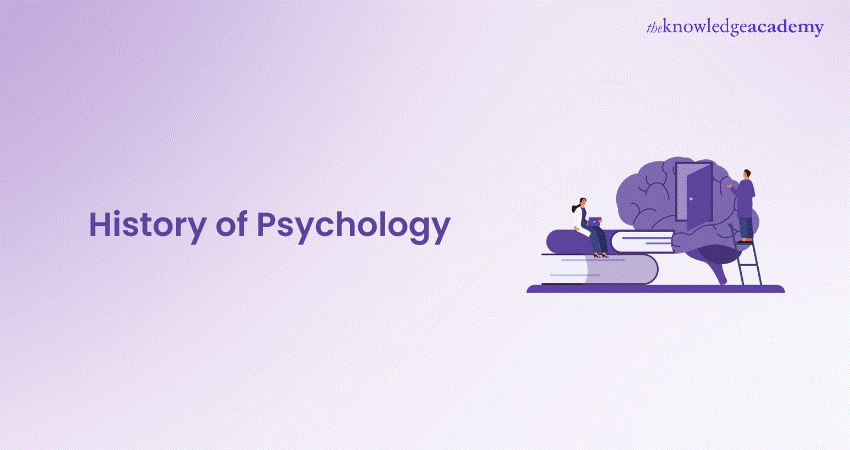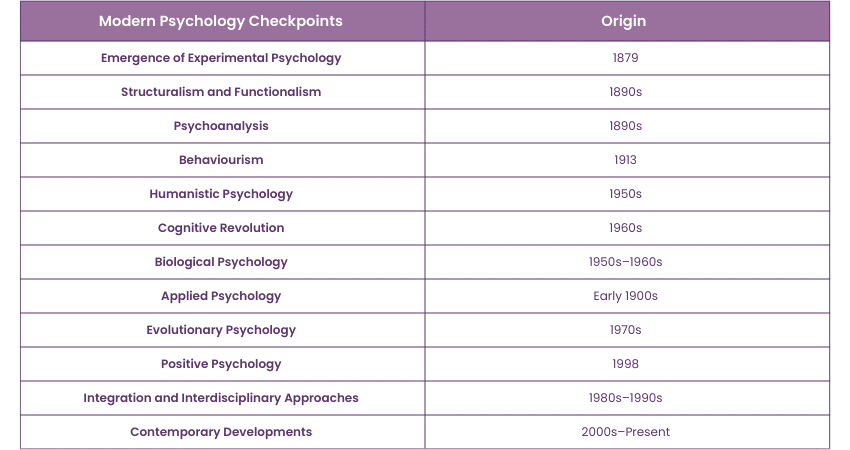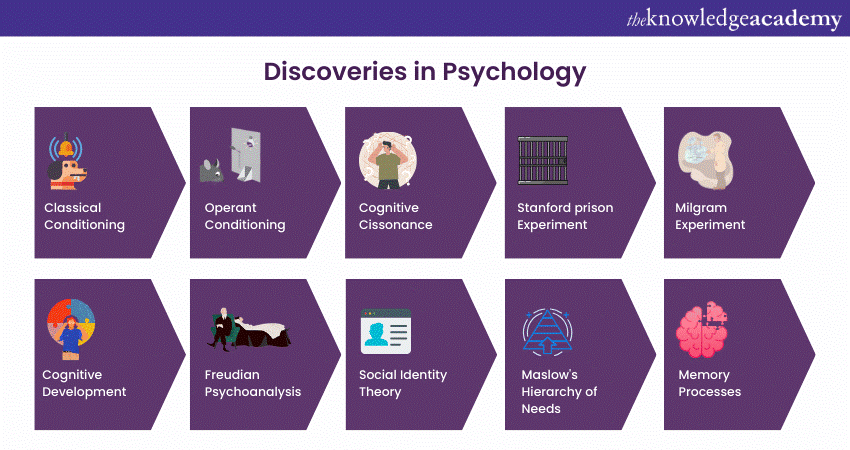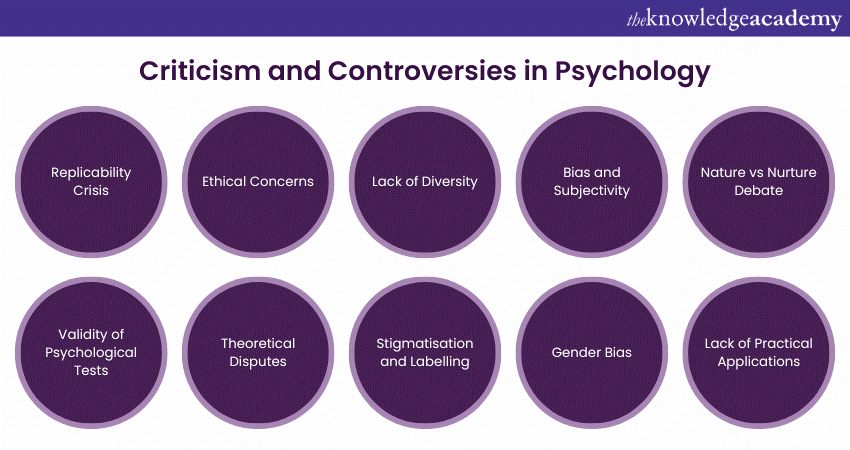We may not have the course you’re looking for. If you enquire or give us a call on 01344203999 and speak to our training experts, we may still be able to help with your training requirements.
Training Outcomes Within Your Budget!
We ensure quality, budget-alignment, and timely delivery by our expert instructors.

Let’s say that you are stuck in a traffic, feeling the tension build as you worry about being late for an important meeting. This everyday stressor might make you wonder how the understanding of stress has evolved over time. To satisfy this curiosity, you can dive into our blog, “History of Psychology: The Ultimate Guide.”
The History of Psychology is a captivating one, filled with groundbreaking discoveries and influential thinkers. From the early debates of Socrates and Confucius to modern cognitive-behavioural therapy, this blog will familiarise you with the key elements that have shaped Psychology. Let’s explore this history and uncover the insights that can shape your understanding of the human mind today.
Table of Contents
1) What is Psychology?
2) Introduction to the Ancient Foundations of Psychology
3) Integration of Philosophy and Physiology
4) A Look at the History of Modern Psychology
5) Women in Psychology History
6) Father of Modern Psychology
7) Looking Back at the key Discoveries in Psychology
8) A Brief Look at the Criticism and Controversies in Psychology
9) Conclusion
What is Psychology?
Psychology, as defined via the American Psychological Association (APA), is the exam of the human mind and behaviour. This area encompasses the observe of the thoughts, its functioning, and its impact on human behaviour. The APA similarly states that Psychology incorporates everything of the human experience, from information brain capabilities to analysing movements of countries, from child development to providing take care of the elderly. It mostly encompasses the following:
It mostly encompasses the following:
1) Scientific Study: Psychology is a scientific discipline that uses empirical research and systematic methods to investigate and understand human behaviour and the mind.
2) Mind and Behaviour: It focuses on two core elements – the human mind and behaviour. The mind refers to mental processes such as cognition, emotion, and perception. In contrast, behaviour pertains to observable actions and reactions.
3) Broad Scope: Psychology includes a considerable range of topics, from individual concept strategies to institution dynamics and from child development to elder care.
4) Multidisciplinary: It integrates knowledge and concepts from diverse fields, along with Biology, Sociology, Philosophy, and Neuroscience to provide a comprehensive expertise of human behaviour.
5) Understanding Motivation: Psychology examines what drives human behaviour. It seeks to understand the motivations, desires, and factors that influence how people think, feel and act.
6) Cultural Influence: It recognises the position of culture in shaping human behaviour and the way cultural variations can have an effect on intellectual strategies and actions.
7) Mental Health: A big part of Psychology entails the study and treatment of intellectual fitness troubles, inclusive of tension, despair, and different psychological issues.
8) Developmental Stages: It explores human improvement throughout the lifespan, from infancy to antique age, and how people change and grow in their cognitive and emotional capabilities.
9) Social Behaviour: Psychology delves into how people engage with each other. It includes to have a look at the aspects like relationships, prejudice, and organisation dynamics.
10) Applied Psychology: Psychology has many practical applications in fields like Clinical Psychology (remedy and counselling), Organisational Psychology (workplace behaviour), Educational Psychology (learning and teaching) and more.

Introduction to the Ancient Foundations of Psychology
The roots of Psychology can be traced back to ancient civilisations, where early thinkers explored the mysteries of the human mind and behaviour. In ancient Egypt, the concept of the soul and its influence on mental health was significant, with healers attributing mental disorders to supernatural forces and treating them through rituals and spiritual practices. Meanwhile, in ancient Greece, philosophers like Socrates, Plato, and Aristotle laid the groundwork for Western psychological thought, emphasising self-examination, the tripartite soul, and empirical observation.
In ancient China, Confucius and Laozi contributed to the understanding of human nature and behaviour through their philosophical teachings. Confucianism emphasised social relationships and moral development, while Daoism explored the balance between mind and body. These ancient foundations provided initial frameworks for understanding the complexities of the human mind, influencing subsequent developments in the field and shaping the diverse perspectives seen today.
Integration of Philosophy and Physiology
The integration of Philosophy and Physiology marked a significant evolution in the field of Psychology. Philosophers like René Descartes and John Locke began merging philosophical inquiry with physiological observations, laying the groundwork for modern psychological thought. Descartes’ dualism, which proposed the separation of mind and body, profoundly influenced later psychological theories. Early Physiologists, by studying brain functions and the nervous system, provided crucial insights into the biological basis of behaviour.
The formal integration of these disciplines was further advanced in the 19th century with the emergence of experimental Psychology, spearheaded by figures like Wilhelm Wundt. This period saw the establishment of Psychology as a distinct scientific discipline, combining empirical methods with philosophical questions about the mind.
The cognitive revolution of the mid-20th century further solidified this integration, emphasising mental processes and incorporating theories such as attachment theory, which highlighted the interplay between mind and body. This fusion of philosophy and physiology has enabled a deeper understanding of how mental and physical processes interact to shape human behaviour.
Learn practical strategies for a more fulfilling life – sign up for our Positive Psychology Course today!
A Look at the History of Modern Psychology
Here is a list of checkpoints in the history of Modern Psychology, discussed in detail:

a) Emergence of Experimental Psychology: The emergence of current Psychology is regularly attributed to Wilhelm Wundt, who set up the first Psychology laboratory in Leipzig, Germany, in 1879. This marked an extensive shift from philosophical speculation to empirical remark and experimentation.
b) Structuralism and Functionalism: Two early schools of idea emerged in the late 19th century. Structuralism, led by means of Edward Titchener, it is aimed to analyse the shape of the thoughts through introspection. Functionalism, championed by William James, is centered on know-how the reason and feature of intellectual processes in adapting to the surroundings.
c) Psychoanalysis: Sigmund Freud revolutionised Psychology along with his Psychoanalytic concept in the early 20th century. He explored the unconscious mind, dream evaluation, and they have an impact on the early youth studies on personality development.
d) Behaviourism: The upward thrust of behaviourism, spearheaded by John B. Watson and later B.F. Skinner, shifted the point of interest of Psychology to observable behaviour in place of internal mental strategies. Behaviourists emphasised the role of conditioning and reinforcement in shaping human actions.
e) Humanistic Psychology: Humanistic Psychology emerged as a response to behaviourism and Psychoanalysis. Figures like Carl Rogers and Abraham Maslow emphasised the significance of individual development, self-realisation, and subjective reviews in understanding human behaviour.
f) Cognitive Revolution: In the mid-20th century, the Cognitive revolution introduced a renewed focus on intellectual tactics. Psychologists along with Jean Piaget and Ulric Neisser explored Cognitive improvement, reminiscence, language, and problem-solving, ushering inside the Cognitive Psychology generation.
g) Biological Psychology: The study of the organic underpinnings of behaviour and intellectual procedures became prominent. Researchers investigated the role of genetics, brain structures, neurotransmitters, and physiological processes in understanding psychological phenomena.
h) Applied Psychology: Various branches of Applied Psychology developed to cope with practical sessions of understanding psychological. Clinical Psychology, Counselling Psychology, Educational Psychology, Industrial-organisational Psychology, and others emerged to apply psychological principles in real-life settings.
i) Evolutionary Psychology: The 1980s noticed the upward thrust of Evolutionary Psychology, which focused on comprehending human behaviour and cognition within the context of evolutionary strategies and model. It explores how natural choice has shaped the psychological developments and behaviours.
j) Positive Psychology: Positive Psychology emerged in the overdue 20th century, moving the focus from pathology to well-being and effective aspects of human functioning. It explores topics including happiness, flourishing, resilience, and strengths.
k) Integration and Interdisciplinary Approaches: Modern Psychology has witnessed expanded collaboration and integration with other disciplines, along with Neuroscience, Sociology, and Anthropology. This interdisciplinary method has enriched the understanding of the complexities of human behaviour.
l) Contemporary Developments: Psychology continues to evolve with ongoing research and technological advancements. Areas consisting of Cognitive Neuroscience, Social Neuroscience, Cultural Psychology, and Cross-cultural Psychology can enhance the understanding of the human mind and behaviour.
Begin your journey towards self-improvement and growth – register for our Personal Development Courses now!
Women in Psychology History
While turning the pages of the History of Psychology, one cannot help but notice a predominant focus on the theories and contributions of male figures. This inclination is not indicative of women's lack of interest in the subject but rather stems from the historical exclusion of women from pursuing formal academic training.
Despite this elimination and lack of recognition, women played key roles in shaping the History of Psychology. Among these pioneering women Psychologists, here’s a list of a few notable figures:
1) Mary Whiton Calkins: Rightfully earned a doctorate from Harvard despite the institution's refusal to confer a degree upon her due to her gender. She had the privilege of studying alongside prominent scholars of her time, such as William James, Josiah Royce, and Hugo Munsterberg. Despite the formidable obstacles she encountered, Mary Whiton Calkins went on to become the first woman President of the American Psychological Association.
2) Anna Freud: Made substantial contributions to the field of Psychoanalysis. Her work involved the description of various defence mechanisms, and she is recognised as the founder of Child Psychoanalysis. Anna Freud's influence extended to other influential Psychologists, including Erik Erikson.
3) Mary Ainsworth: A Developmental Psychologist who significantly advanced the comprehension of attachment. She developed a groundbreaking method for studying child and caregiver attachments, known as the "Strange Situation" assessment.
These remarkable women Psychologists exemplify the resilience and dedication of female scholars in the field of Psychology.
Learn how to influence and inspire positive change in communities – join our Social Psychology Training now!
Father of Modern Psychology
In 1879, Wilhelm Wundt established the first-ever Psychology laboratory in Leipzig, Germany, earning him the title “Father of Psychology.” His influential work, “Principles of Physiological Psychology,” published in 1873, laid the groundwork for his objective investigation of the human mind. Wundt developed the method of introspection, which involves the impartial observation of one’s thoughts and emotions
By training individuals in introspection and conducting repeated tests, he aimed to dissect the elements of the human mind and understand how these components collectively give rise to conscious experiences, shaping the early foundations of Psychology.
While Wundt is often credited with founding Psychology, some researchers argue that Gustav Fechner also deserves recognition for his groundbreaking work. In 1850, Fechner made a profound connection between the mind and body, leading to his notable contribution known as “Fechner’s Law.” This principle explains the direct relationship between the perception of a stimulus and its intensity, opening new avenues for measuring behaviours within Psychology.
Start your journey towards self-discovery and transformation – join our Psychology of Personal Growth Training.
Looking Back at the key Discoveries in Psychology
Let’s have a look back at some of the significant discoveries in the History of Psychology:

a) Classical Conditioning: Ivan Pavlov's experiments with dogs led to the discovery of classical conditioning. He observed that dogs could be trained to associate a neutral stimulus (such as a bell) with a reflexive response (such as salivation) through repeated pairing. This discovery laid the foundation for understanding how learned associations shape behaviour.
b) Operant Conditioning: B.F. Skinner's research on operant conditioning revealed how behaviour is influenced by its consequences. Skinner demonstrated that behaviour can be shaped through reinforcement (rewarding desired behaviour) and punishment (discouraging undesirable behaviour). He highlighted the role of consequences in learning and behaviour change.
c) Cognitive Dissonance: Leon Festinger's theory of cognitive dissonance explores the discomfort experienced when there is a mismatch between our beliefs, attitudes, and behaviours. This discovery highlighted the importance of cognitive consistency and the motivation to reduce dissonance. This further led to increased research on attitude change and decision-making processes.
d) Stanford Prison Experiment: Philip Zimbardo's controversial Stanford Prison Experiment tested the effective impact of situational factors on human behaviour. The study revealed how the roles assigned to people (prisoners or guards) in a simulated jail environment brought about drastic behavioural adjustments, highlighting the ability for abuse of electricity and the impact of social roles.
e) Milgram Experiment: Stanley Milgram's Obedience experiments tested the willingness of individuals to obey authority figures, even when it conflicted with their personal moral values. The study discovered the volume to which human beings would administer what they believed to be harmful electrical shocks to others under the effect of an expert discern. This test raised moral questions and highlighted the energy of situational factors on behaviour.
f) Cognitive Development: Jean Piaget's studies on cognitive improvement in youngsters diagnosed key tiers of cognitive boom. His paintings emphasised the significance of children actively building expertise through interactions with their environment. Piaget's degrees, including sensorimotor, preoperational, concrete operational, and formal operational, constantly inform our expertise of how cognition develops.
g) Freudian Psychoanalysis: Sigmund Freud's Psychoanalytic concept revolutionised Psychology by introducing the idea of the subconscious mind and the affect of early formative years reviews on character improvement. His theories at the shape of the mind (identification, ego, and superego) and defence mechanisms supplied a framework for comprehending human behaviour and the remedy of mental disorders.
h) Social Identity Theory: Henri Tajfel's social identity concept explored how individuals' ideas of social identity are formed by way of their membership in social companies. The principle highlighted the psychological processes involved in intergroup dynamics, prejudice, and discrimination, dropping light on the social aspects of human behaviour.
i) Maslow's Hierarchy of Needs: Abraham Maslow's hierarchy of Needs proposed that people are encouraged by using a hierarchy of needs, ranging from physiological desires to self-actualisation. The concept emphasised the significance of pleasing basic requirements earlier; rather than striving for self-development and self-fulfilment.
j) Memory Processes: Research on reminiscence techniques, which include encoding, storage, and retrieval, has supplied precious insights into how records is received, maintained, and retrieved. Studies on working memory, long-term memory, and reminiscence retrieval have informed instructional practices, cognitive rehabilitation, and the expertise of memory-related disorders.
Discover the power of living in the present moment – register for our Mindfulness Training now!
A Brief Look at the Criticism and Controversies in Psychology
Let’s have a brief look at the criticism and controversies in the field of Psychology over centuries:

a) Replicability Crisis: Psychology has faced grievance regarding the replicability of research findings. Some studies have struggled to reproduce, thereby leading to concerns about the robustness and reliability of positive findings. This has brought about discussions across the importance of transparency, rigorous methodology, and replication efforts in psychological research.
b) Ethical Concerns: Ethical issues in psychological research have been a subject of scrutiny. Controversies have emerged surrounding problems consisting of knowledgeable consent, deception in experiments, protection of participants' privacy and confidentiality, and the capability for harm or misery. These concerns have spurred the development of ethical tips and evaluation boards to guarantee the ethical conduct of research.
c) Lack of Diversity: Critics have highlighted the shortage of variety and representation in psychological studies samples, particularly in terms of ethnicity, socio-economic status, and cultural backgrounds. This drawback raises questions about the generalisability of findings and the quantity to which psychological theories practice to various populations.
d) Bias and Subjectivity: Psychology has been criticised for capability bias and subjectivity in research, inclusive of researcher bias, publication bias, and the translation of data. Concerns have been raised about the impact of personal beliefs, values, and theoretical views on study layout, records collection, and the reporting of effects.
e) Nature vs Nurture Debate: The lengthy-standing debate about the relative impact of nature (genetics) and nurture (surroundings) on human behaviour and improvement has sparked controversy within Psychology. Different perspectives and conflicting research findings have fuelled debates and criticisms regarding the relative contributions of genetic and environmental factors.
f) Validity of Psychological Tests: The validity and reliability of Psychological checks, which includes intelligence checks, personality tests, and diagnostic equipment have been questioned. Critics argue that these traits won't competently capture the complexities of human behaviour and may be stimulated by cultural biases or obstacles in dimension.
g) Theoretical Disputes: Psychology encompasses various theoretical perspectives and approaches, leading to disagreements and controversies among researchers and practitioners. Disputes arise regarding the validity and superiority of different theories, leading to ongoing debates and the need for further empirical evidence to resolve conflicts.
h) Overemphasis on Western Context: Some critics argue that Psychology has historically focused heavily on Western cultures, theories, and populations. This bias has been criticised for neglecting the contributions and perspectives of non-western cultures and limiting the generalisability of psychological findings across diverse cultural contexts.
i) Commercialisation and Misuse of Findings: Concerns have been raised about the commercialisation of psychological research and the potential misuse of findings. The application of psychological principles in advertising, marketing, and persuasive techniques has raised ethical concerns regarding manipulation and the potential for harm.
j) Stigmatisation and Labelling: The classification and labelling of mental disorders in the Diagnostic and Statistical Manual of Mental Disorders (DSM) have faced criticism. Some argue that diagnostic categories may lead to stigmatisation, pathologisation of normal behaviour, and overreliance on medication-based treatments.
k) Gender Bias: Criticism has been directed towards gender bias in psychological research, with concerns about the over-generalisation of findings from male samples to females. This has led to a call for increased gender inclusivity and the consideration of gender-specific factors in research and practice.
l) Lack of Practical Applications: Critics have questioned the practical applications and real-world impact of psychological research. They argue that some studies may have limited relevance to everyday life or fail to provide tangible solutions to societal problems.
Conclusion
The History of Psychology reveals profound insights and pivotal moments that shape our understanding of the human mind. From ancient philosophies to modern therapies, each chapter showcases the remarkable journey of psychological thought. Explore this history
Explore the depths of Emotional and Social Intelligence – sign up for our Introduction To Emotional and Social Embodied Cognition Training.
Frequently Asked Questions

The first recognised psychologist in history is Wilhelm Wundt, often referred to as the "father of Psychology." In 1879, he established the first Psychology laboratory in Leipzig, Germany, marking Psychology as a distinct scientific discipline.

Psychology, as a formal field of study, is over 140 years old, dating back to the late 19th century when Wundt's laboratory was founded.

The Knowledge Academy takes global learning to new heights, offering over 30,000 online courses across 490+ locations in 220 countries. This expansive reach ensures accessibility and convenience for learners worldwide.
Alongside our diverse Online Course Catalogue, encompassing 19 major categories, we go the extra mile by providing a plethora of free educational Online Resources like News updates, Blogs, videos, webinars, and interview questions. Tailoring learning experiences further, professionals can maximise value with customisable Course Bundles of TKA.

The Knowledge Academy’s Knowledge Pass, a prepaid voucher, adds another layer of flexibility, allowing course bookings over a 12-month period. Join us on a journey where education knows no bounds.

The Knowledge Academy offers various Mental Health Courses, including the Mental Health and Wellbeing Training, Mental Capacity Training, and Mindfulness Training. These courses cater to different skill levels, providing comprehensive insights into Importance of Psychological Safety in the Workplace.
Our Health & Safety Blogs cover a range of topics related to Psychology, offering valuable resources, best practices, and industry insights. Whether you are a beginner or looking to advance your Health and Safety knowledge, The Knowledge Academy's diverse courses and informative blogs have got you covered.
Upcoming Health & Safety Resources Batches & Dates
Date
 Psychology Course
Psychology Course
Fri 14th Feb 2025
Fri 11th Apr 2025
Fri 13th Jun 2025
Fri 15th Aug 2025
Fri 10th Oct 2025
Fri 12th Dec 2025







 Top Rated Course
Top Rated Course


 If you wish to make any changes to your course, please
If you wish to make any changes to your course, please


